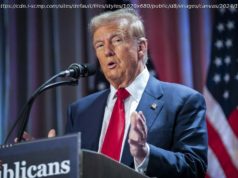In her presidential weekly briefing, Samantha Vinograd writes that President Trump will need to navigate a potentially tense G7 summit with six of our closest allies.
G7 summit: When seven is a crowd
With less than a week until the Group of Seven summit — an informal grouping of seven of the world’s advanced economies — we have provided an assessment of how the other G7 leaders from Canada, France, Germany, Italy, Japan and the United Kingdom are approaching the meeting.
And our assessment comes at a critical time since you will be engaging with a tough crowd — our allies. Expect the group to have coordinated extensively in advance regarding US policies on trade, Iran and climate change. In fact, French President Emmanuel Macron is meeting with Canadian Prime Minister Justin Trudeau ahead of the G7 to reportedly prepare for the summit.
G7 leaders are also likely hoping to use time with you to discuss North Korea, Russia and other national security issues.
The G7 has historically offered an opportunity for members to «build consensus and set trends.» The non-US members of the G7 do already have a consensus — unfortunately, it’s against us.
For example, they have already issued a statement conveying their «unanimous concern and disappointment» for the US decision to impose steel and aluminum tariffs. .
So while Canada, which holds the presidency of the G7, has designed a formal agenda focused on the themes of gender equality, women’s empowerment, clean energy and economic growth that works for everyone, divisions between the US and all the other members will likely dominate headlines and private discussions.
The G6 will be ready for battle:
Canada: Trudeau will be looking for your support on his G7 agenda themes like gender equality and inclusive growth, but you should expect Trudeau to be ready to chastise you publicly on trade. He has already called your new steel and aluminum tariffs «totally unacceptable» and a » deplorable » decision. Canada said it will retaliate with about $12.8 billion worth of tariffs on our products. And Trudeau has taken particular umbrage at your implementing the tariffs based on a national security justification that steel and aluminum tariffs impair our national security, so you can expect him to push you on that justification.
Trudeau likely considers your new tariffs the final nail in the NAFTA coffin and may say that publicly when you are together. He will probably continue to emphasize the close relationship between Canada and the American people while simultaneously pointing to a lack of «common sense» on the part of your administration when it comes to trade.
He’s also a big proponent of combating climate change, and because he is leading the summit, he may try to paint the administration as the outlier on both the rules-based global trading system and on the Paris climate agreement.
France: Relying on the strength of your personal relationship, you should expect Macron to push you on climate change like he did while in Washington, Iran sanctions waivers and trade policy. After his call to you last week, in which he said the tariffs were a mistake and illegal, Macron will not shy away from telling you what he thinks — especially as he does some jockeying for power within the European Union, which is lodging a dispute with the World Trade Organization. He’s already said he’ll try to protect French companies doing business in Iran from newly reinstated US sanctions, so expect him to push you on sanctions waivers while he works with Iran to salvage the deal.
Additionally, he was in Russia last month (Russia’s membership in the then-G8 was suspended after it invaded Crimea), and spoke about the need for dialogue and building «an atmosphere of trust» between France and Russia, so he may want to discuss ways to mitigate tensions with President Vladimir Putin when he sees you.
Germany: Chancellor Angela Merkel may try to play good cop to Macron’s bad cop. Her visit to Washington last month went smoothly, despite differences on tariffs and Iran, and she even mentioned a willingness to explore a bilateral trade agreement. Germany is the biggest EU exporter to the US, and Merkel may try to calm down Macron and her EU counterparts (the president of the European Council and the president of the European Commission represent the EU at G7 summits) to avoid a full-scale trade war.
But she is probably worried that you will publicly chastise Germany for not boosting its military spending more quickly, moving ahead with a controversial gas pipeline with Russia and Germany’s desire to continue doing business with Iran. So, you can ease her nerves by not publicly taking her to task in exchange for her taking a less combative tone with you over trade and Iran. Remember, though, she has a large auto worker constituency to answer to back home, people who are deeply concerned over your announcement about potential new tariffs on auto and vehicle parts.
Italy: Italy’s new Prime Minister Giuseppe Conte was sworn in on Friday after a months’ long political impasse. The anti-establishment Five Star Movement and the right-wing League formed Western Europe’s first populist government and now are charged with addressing such issues as Italy’s large public debt (second only to Greece’s) while maintaining their commitment to raise public spending.
They’ve previously backed calls to leave the EU, so expect some awkward moments between Conte and EU counterparts — and both sides may be looking for you to back them up. Conte is a political novice (a former teacher) who thinks he has a lot to prove. He has said Italy is «second to no one,» which means he may share some of your views on putting national needs ahead of global ones.
Japan: Prime Minister Shinzo Abe will meet with you in Washington before the G7, and you will have an opportunity to coordinate with him on messaging, which could be helpful before you dive into the meeting. Abe is eager to be kept in the loop on all things North Korea, and if you make him feel fully briefed, he could be an ally at the G7 table.
You shouldn’t expect him to support your tariff decisions, but on the heels of the «G6» statement condemning US tariffs, the Japanese Finance Minister Taro Aso said that direct discussions between you and Abe may help resolve the issue (Japan has refused to accept import quotas).
And don’t forget China. Abe thinks Japan is being penalized for excess steel production in China, and he has ongoing concerns about China’s increasingly aggressive posture in the region (despite some recent bilateral rapprochement).






